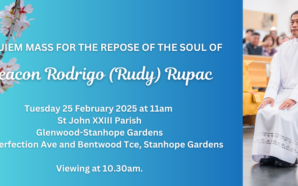Anne-Cathy Graber was surprised when Mennonite World Conference received an invitation to send a delegate to the Roman Catholic Synod on Synodality’s concluding assembly in Rome.
“The invitation was amazing, considering how small the Mennonite world is,” said Graber, secretary for ecumenical relations for MWC.
Graber, 60, is an itinerant Mennonite pastor in France. She was tapped by MWC general secretary Cesar Garcia to be one of the 16 fraternal delegates from Orthodox, Anglican, Lutheran, Methodist, Reformed, Baptist, Mennonite, Pentecostal and Disciples of Christ churches at the synod.
As a fraternal delegate at the Oct. 2-26 assembly, Graber — who is also co-director of the Chair of Ecumenical Theology at the Faculties Loyola Paris and a member of a religious order that promotes Christian unity — could fully participate in discussions with 368 delegates from around the world. The only thing she could not do was vote.
Speaking in Rome near the end of the synod, Graber said she appreciated being able to participate in discussions about how the Roman Catholic Church can be the church in the world today.
She spoke warmly of the close relationships she developed with other delegates, including cardinals, bishops, priests and lay people.
At first, Graber had to explain about Mennonites to them. But after that, her “voice and presence were welcome just like everyone else’s,” she said. “Everyone counted, even those of us from the smallest denominations.”
Graber valued how the synod’s communal discernment. Delegates sat 10 to 11 at a table with a facilitator in the Paul VI assembly hall adjacent to St. Peter’s Basilica. During the first round of discussion each day, each one spoke for three minutes. In the second round, each person took a turn to say what stood out to them from what the others had shared.
After that, the group paused again before engaging in a more free-flowing discussion about what had emerged during the first two rounds. At the end a report was given from each table to the larger delegate body.
For Graber, the process promoted deep listening, which she thinks MWC can benefit from when dealing with challenging issues facing the worldwide Anabaptist/Mennonite church.
Graber was able to speak informally with Pope Francis, who also sat at a table with the delegates.
“I thanked him for the invitation,” she said, explaining she was a Mennonite. “He seemed to know who Mennonites were, telling me we must all walk together as Christians.”
Graber noted the Catholic Church didn’t need to invite MWC to the synod, especially since it represents such a small group. But the fact it did shows how committed that church is to synodality — or “journeying together” — with all Christians. “It showed that every voice matters,” she said.
For MWC General Secretary César García, being invited to the synod was “a testament to the unique perspective and contributions that the Anabaptists can bring to the global Christian community.”
The invitation was another step in the MWC’s relationship with the Roman Catholic Church. The two groups have been in dialogue since 1998.
“The Roman Catholic Church and other Christian communions truly appreciate the unique gifts we bring as a historic peace church,” García said.
Being part of the synod was an opportunity to learn from the Roman Catholic Church “about their understanding and practice of being a global church,” García said, adding it has “developed a fascinating global and multicultural discernment process on crucial topics” that can aid MWC.
For Graber, being part of the Synod on Synodality general assembly in Rome was an extension of her daily life as a member of Chemin Neuf (New Way), a religious community founded in 1973 that brings together Christians from different denominations.
“We don’t worry about the big doctrinal issues, we just live together and show trust in each other,” Graber said of her 37 years as a member of that order, which has 2,000 members in 30 countries.
Republished with permission, with thanks to Anabaptist World.








